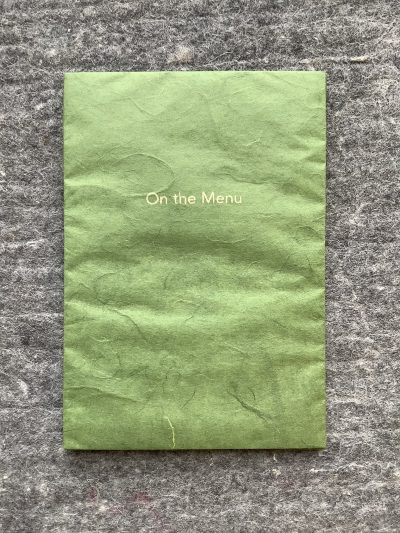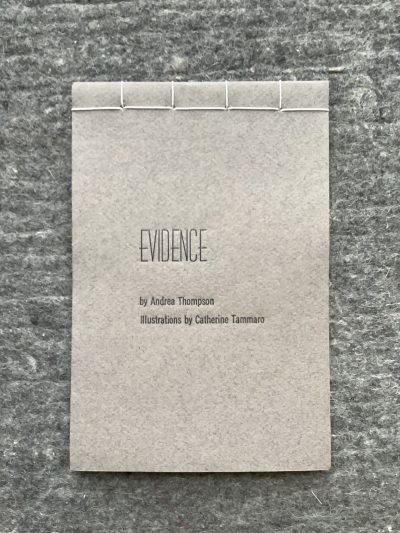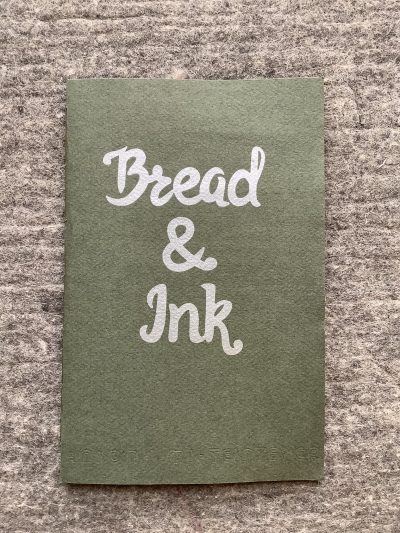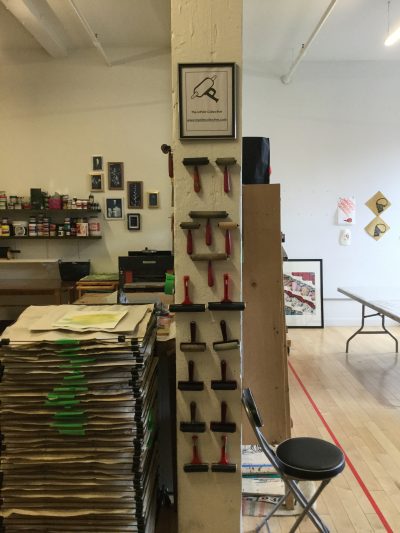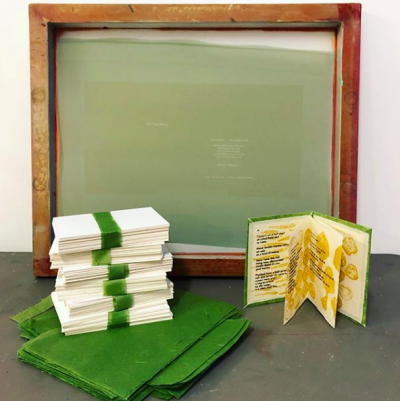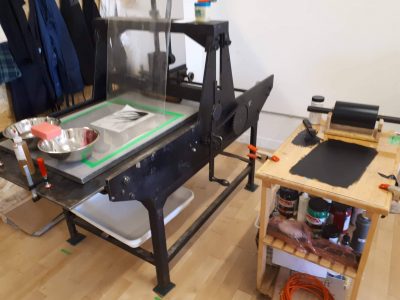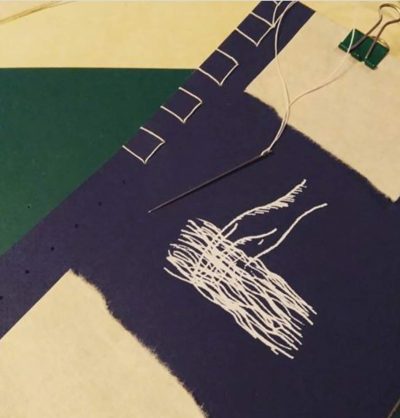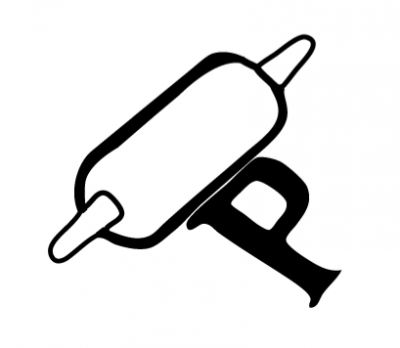
Poetry inPrint is a collaborative residency press running out of the inPrint Collective Studio, as a partnership with Jacqueline Valencia.
The inPrint Collective is a Toronto-based group of printmakers who love print and want to share it with the world. We came together in 2008 (because printmakers love company) to support each other and promote printmaking in our communities. Since then, we have been inking our plates, rolling up our stones, running down our squeegees, and carving out our ideas. When we’re not in the studio, we’re putting on workshops, group exhibitions and numerous community events. inPrint is a registered non-profit, and proud to continue to produce community-based projects that reflect on printmaking’s story-telling potential.
Jacqueline Valencia is a writer and critic. She is the author of There Is No Escape Out Of Time (Insomniac Press, 2016) and is the founding editor of These Girls On Film, a literary editor at The Rusty Toque, and staff film critic at Next Projection. Jacqueline is a board member of CWILA (Canadian Women In Literary Arts). jacquelinevalencia.wordpress.com
Poetry inPrint is a writer’s residency in a printmaker’s studio. In collaboration with local author Jacqueline Valencia, organizer of the Toronto Poetry Talks Symposium, this program paired eight local visual artists, including members of the inPrint Collective, with eight local poets in 2019. Artists and poets selected are at various stages in their career, and spent several months working together to create a series of hand-printed, and hand-bound chapbooks. This is the first-ever residency to be hosted by inPrint, in our first permanent community studio space. The journey that lay ahead of us was unknown but highly anticipated.
The bookworks take their cues from recent and on-going conversations of systemic oppression as experienced in the CanLit world and twinned in the visual arts. We took the position with this residency that art is not made in a vacuum, that social and historical contexts shape what stories we tell and hear, what images we make and see, mirroring back not just aesthetics but identities and paradigms that impact lived realities. It is not meaningless when CanLit heavyweights in major university programs proclaim that there are no good modern women writers worth teaching, or when other authors quit due to anti-black racism. This is mirrored in the art world, where not too long ago a spate of women-identified curators and directors were fired for being ‘too political ’and ‘too demanding’. These are but just a few examples, as we see our newsfeeds reflect even more attacks on reproductive access, LGBTQ rights, immigration, Indigenous land treaties, and more. We felt the project timely, and we are excited to share and make space for what this group of artists has to say to the world at large.
What about small press publishing is particularly exciting to you right now?
inPrint took on this project with no experience in publishing, but a lot of experience in hand-made printmaking and bookbinding. So for us, working with a critical thinker and writer like Jacqueline Valencia was an exciting prospect in bringing multi-disciplinarity to our arts organization, but also presented us with the possibility of developing an arm of inPrint in publishing very small editions of handcrafted artist books, connecting us better to the larger Toronto arts scene. Printmaking and bookbinding is a natural marriage of art forms, and poetry in particular seemed a perfect fit to inspire those books. Developing this residency in small press format allowed us the ability to put these books out into the world as both works of literature and art objects, and reminding readers of the materiality of engaging with a book. These books’ duality as poetry and art allows their makers to take up space in a myriad of ways from the emotional and intellectual to the physical and tactile. By setting ourselves us as a small press, we could make our own rules on what this could look like, and make that space happen.
How does your press work to engage with your immediate literary community, and community at large?
It was important for inPrint to have the consultation with the literary community when embarking on this project, and so having Jacqueline Valencia come onboard as a partner, participating poet, and editor was key. While we reached out to local artists to work with, she outreached and curated our poets, who were in various stages of their careers. Poets and artists were paired and given the freedom to choose to collaborate in whatever ways they saw fit, and as a result we saw incredible ways of working come to fruition. It was also so interesting to see how both images and words were impacted by the reality of hand making a book-in this digital age; while we haven’t lost our sense of composition, handmaking a small size book, limited to 20 pages maxed presented a thoughtful challenge, reminding us that the page, the PAPER, itself is part of the process. We believe this translates to the reader/viewer as they engage with these books.
Tell us about three of your publications. What makes them special, needed, and/or unique?
In the first edition of Poetry inPrint, eight publications emerged. The three we selected to showcase here are unique for many reasons. Physically, they showcase three different styles of hand-binding. “On the Menu” is a classic accordian-fold, only one of two books in hardcover and is printed beautifully in silkscreen. “Evidence” is done in Japanese stab-binding style, allowing the writer and artists to work on individual pages versus a folio, and printed using pronto-plate lithography, with a letterpress cover. “Bread & Ink” is done in Coptic-style binding, also silkscreened, and here the artist pairing played with the folds of their pages, impacting the way the poems and images are consumed. Each book explores the different perspectives of the artist pairings, reflecting varied methodologies of art-making, and reflections of making art within an intersectional feminist lens that also highlights the labour of creativity.
How have the current multiple global crises impacted your work with the press?
With the success of the Poetry inPrint as our first artist residency, we felt buoyed at the prospect of holding more of these and developing this as a semi-regular, if not limited, run of publications. With COVID-19 lockdown measures, we are seeing a challenge in developing our own revenue to fund this work, struggles to maintain the rent on our studio where these books could be made, as well as more competition to grant councils that do not often fund the “same” project twice, impeding our ability to support the artists we’d like to take up space in our studio. There is also that the reality of collaborating on hand-made books— it requires a physical presence which social distancing does not allow for very easily. However, we feel that programs like Poetry inPrint are also timely and important to uphold artists’ expressions around racism and colonialism, amongst other social ills that COVID-19 has only amplified, and remain hopeful that we can continue to produce more work in this vein.
